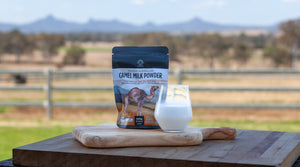Camel Milk and Diabetes: Natural Support
As we mark World Diabetes Day, it’s an opportune time to discuss camel milk’s potential benefits for diabetes management. For individuals managing diabetes mellitus—camel milk and camel milk powder may offer a unique and promising supplementary option. This traditional beverage, widely consumed in camel-herding communities, has drawn attention from researchers for its potential impact on blood glucose and insulin levels.
How Camel Milk May Benefit Diabetics
Diabetes is a condition where the pancreas does not produce enough insulin, leading to high blood glucose levels. Insulin therapy and blood sugar management are core parts of treatment, but camel milk offers an intriguing alternative due to its insulin-like proteins, which are more easily absorbed into the bloodstream without coagulating in the stomach. This feature is unique to camel milk and sets it apart from cow or goat milk, potentially allowing for a smoother and faster absorption of its insulin-like properties.
While research has shown promising benefits of camel milk for managing blood glucose levels in diabetes, it is crucial to understand that Type 1 and Type 2 diabetes are distinct conditions. Type 1 diabetes is an autoimmune disorder where the body cannot produce insulin, while Type 2 diabetes is often related to insulin resistance. Camel milk has been found to offer benefits, especially for those managing Type 2 diabetes, but it is not a substitute for insulin therapy in Type 1 diabetes. Please consult with your healthcare provider and review the latest studies to find treatments tailored to your specific needs.
Success Stories: Real-Life Experiences with Camel Milk for Diabetes Management
Many individuals with diabetes have shared stories of how camel milk has supported their health journeys. Among them, Lester Kaese’s experience stands out as a powerful example of the potential benefits of camel milk for diabetes management. Having managed type 2 diabetes for over 30 years, Lester describes how adding camel milk to her diet has helped stabilize her blood sugar levels and improve her overall well-being.

Lester explains that after incorporating camel milk into her daily routine, she noticed gradual yet significant changes in her blood glucose readings. Over time this has enabled her to safely reduce some of her diabetes medication under medical supervision. For Lester, the ability to lower her medication dosage made her feel less dependent on pharmaceutical interventions and allowed her to better manage her condition naturally.
Lester also praises the taste and quality of camel milk, noting it has become a staple in her diet not only for its health benefits but also for its enjoyable flavour. She believes camel milk offers good value for the positive impacts it has had on her health, and she feels empowered by the improvements in her diabetes management. She now recommends camel milk to others with similar conditions, stressing the importance of trying natural options alongside standard treatments.
Lester’s story is just one of many positive testimonials from people managing diabetes with the support of camel milk. Her experience emphasizes the importance of taking a holistic approach to diabetes care and highlights the potential of camel milk as a complementary option for blood sugar control and insulin sensitivity. As with any dietary change, it’s important to consult a healthcare provider before adding camel milk to your routine, particularly for those on insulin or other medications.
Nutritional Profile and Additional Benefits of Camel Milk
Camel milk is rich in bioactive components with potential benefits for people with diabetes:
- High Levels of Immunoglobulins: These antibodies help fight infections, potentially offering additional immune support for individuals with diabetes, who are often more susceptible to infections.
- Lactoferrin and Lactoperoxidase: These proteins possess antimicrobial and antiviral properties, adding another layer of protection.
- Peptidoglycan Recognition Proteins (PGRPs): PGRPs can modulate inflammation and support gut health, beneficial for those managing diabetes-related inflammation or gut health concerns.

Key Studies on Camel Milk and Diabetes Management
Research on camel milk's effects on diabetes is ongoing, but initial findings are encouraging. Here’s a summary of some significant studies:
- Systematic Review (2017): A review of 22 studies (11 animal studies and 11 clinical trials) found that camel milk showed a consistent positive effect in reducing diabetes markers like blood glucose and insulin levels, particularly when consuming 500ml per day. Within as little as three months, improvements in blood sugar levels were noted, suggesting that regular consumption may support glycemic control.
- Type 1 Diabetes Trials: Clinical trials led by Dr. RP Agrawal in India, where camel milk consumption is traditional, showed that individuals with type 1 diabetes experienced reduced insulin requirements, lower fasting blood sugar, and improved A1c levels over extended periods. These studies highlighted camel milk’s role as a potential adjunct to insulin therapy, though it should not be considered a complete substitute for insulin.
- Animal Studies: Studies on diabetic rats have repeatedly shown that camel milk improves blood glucose and insulin levels. A recent study in Australia on pigs (an animal model with metabolic similarities to humans) found that camel milk improved insulin effectiveness and uptake, suggesting promising implications for human health.
- Recent Molecular Studies (2021): Research from the United Arab Emirates University investigated the molecular basis of camel milk’s antidiabetic effects. This study focused on bioactive peptides in camel milk that interact with insulin receptors and enzymes that regulate blood glucose. The findings point to camel milk’s influence on the body's glucose homeostasis, a critical factor for those managing diabetes.
For more information about the studies on Camel Milk and diabetes, check out this article.
Final Thoughts
While more rigorous studies are needed to fully understand camel milk’s role in diabetes management, current research supports its benefits as a supplementary option for improving blood glucose control and insulin sensitivity. This World Diabetes Day, camel milk offers an intriguing natural avenue for those looking to explore alternative ways to support their health.
For those interested in trying camel milk, please consult with a healthcare professional, especially if you are on diabetes medication. Camel milk may be a promising ally in managing diabetes, but it should be part of a comprehensive approach under professional guidance.
Where Can I Buy Camel Milk and Camel Milk Products?
Fresh Milk - Our award-winning Camel Milk is a great dairy alternative, and contains no beta-casein A1. It is rich in vitamins, minerals, healing immune proteins and its silky, smooth and clean texture makes it the best tasting milk for every occasion. You can buy fresh Camel Milk from our farm near Harrisville Qld or from a range of stockists in Southeast Queensland. For bulk orders, please place an order with us prior to your visit. Home delivery is also available to selected postcodes in Brisbane, Gold Coast and Sunshine Coast.

Powdered Milk –
Our fresh Camel Milk is freeze dried to lock in the pure goodness. Add some Camel Power to your day! A perfect addition to milkshakes, smoothies, or for adding to cooking. Available in 100g and 200g sealed packs.
- Pure Australian Camel Milk
- 100% Natural
- No additives or preservatives
- Rich source of vitamins and minerals
- Halal Certified
Available from our farm or shop online.

Summer Land Camels is Australia’s Largest Camel Dairy and is located near Harrisville in the beautiful Scenic Rim, only 45 minutes from Brisbane and just over an hour from the Gold Coast and Toowoomba.


